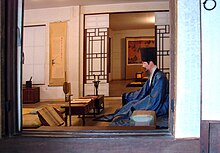Unhyeongung
| Unhyeongung | |
|---|---|
 | |
 | |
| General information | |
| Address | 114-10 Unni-dong, Jongno District |
| Town or city | Seoul |
| Country | South Korea |
| Other information | |
| Public transit access | Subway Line 3, Anguk Station, Exit 4 |
| Website | |
| www | |
| Korean name | |
| Hangul | 운현궁 |
| Hanja | |
| Revised Romanization | Unhyeongung |
| McCune–Reischauer | Unhyŏnkung |
Unhyeongung (Korean: 운현궁), also known as Unhyeongung Royal Residence, is a former Korean royal residence located at 114-10 Unni-dong, Jongno-gu, Seoul, Korea. It was formerly the residence of the Heungseon Daewongun a prince regent of Korea during the Joseon period in the 19th century, and father of Emperor Gojong. Gojong himself also lived in this residence until age 12 when he assumed the throne.[1][2] It is currently a museum and is open to the public free of charge.
History
[edit]

The site dates from the 14th century. Early buildings were damaged or destroyed during the Japanese invasions of Korea (1592–1598), but some of the early construction remains. Under the direction of Queen Mother Jo, Unhyeongung was converted into a grander complex with four gates.
Although the residential complex was taken from the Heungseon Daewongun's descendants under Japanese colonial rule, it was returned in 1948, and in 1993 they sold it to the Seoul government. It subsequently underwent three years of renovations to restore it to its earlier appearance.[3]
Today's complex is smaller than its previous extent, as Duksung Women's University now occupies part of its grounds, as well as other smaller businesses including Unhyeon Kindergarten and Byeolhadang hanok guesthouse.[4] The remaining complex includes:
Structures
[edit]Some of the interiors have been refurnished, and contain mannequins dressed in typical clothing styles for various stations of life in Korean history. The complex also contains a small museum. The residence is open to the public,free of charge.
Norakdang Hall
[edit]Norakdang is the largest building within the complex and is the site of wedding of King Gojong and Empress Myeongseong. Norakdang also was as one of the two residence buildings for women.
The most notable structure inside Norakdang is the kitchen, which was most likely used for food preparation when hosting important events. The hall held many important events such as birthday parties and related ceremonies.
A reenactment of a traditional wedding ceremony continues to be held at Norakdang.[1]

Noandang Hall
[edit]Noandang was where the Heungseon Daewongun received his guests and also served as the leisure quarters for the men. The hall was not just a place of leisure and entertainment. The Heungseon Daewongun, as the father of a young Emperor, carried out all his business from Noandang.[1]
Irodang Hall
[edit]Irodang is one of two woman's residences on the residence complex.
Sujiksa
[edit]Sujiksa is a small row of rooms to the right from the entrance. These rooms provided housing for the servants and guards.[1]
Royal wedding ceremony
[edit]
Unhyeongung is the site for the last Royal wedding ceremony, a reenactment of King Gojong and Empress Myeongseong's wedding that took place on the grounds of Unhyeongung on March 21, 1866. This reenactment takes place in the spring and fall of every year.[5][6]
This ceremony is an exact reenactment, based on thorough historical research and consultation by the palace’s counsel panel, of the regal and grandeur style of the imperial family's royal wedding ceremony. This reenactment offers visitors an opportunity to experience the spectacular and elegant traditional royal costumes and lifestyles of the Joseon dynasty.[7][8]
Gallery
[edit]-
Royal wedding ceremony reenactment
-
Royal wedding ceremony reenactment
-
Royal wedding ceremony reenactment
See also
[edit]References
[edit]- ^ a b c d "Imagine Your Korea : Official site". VisitKorea.or.kr. Retrieved 2010-08-22.
- ^ Lee, Sun-min (18 September 2010). "This is no ordinary Chuseok". Korea JoongAng Daily. Archived from the original on June 29, 2013. Retrieved 9 April 2013.
{{cite news}}: CS1 maint: unfit URL (link) - ^ "Unhyeongung Palace". Virtualtourist.com. Retrieved 2010-08-22.
- ^ "Prologue". Yoo's Family. Retrieved 2016-11-02.
- ^ "Imagine Your Korea : Official site". VisitKorea.or.kr-event. Retrieved 2010-08-22.
- ^ Joe, Yonghee (23 September 2004). "Holiday fun for the foreigner". Korea JoongAng Daily. Archived from the original on June 29, 2013. Retrieved 9 April 2013.
{{cite news}}: CS1 maint: unfit URL (link) - ^ "JEJU ISLAND INFORMATION and TOURS". Archived from the original on 2011-07-22. Retrieved 2010-08-22.
- ^ "Court Wedding Reenacted at Unhyeon Palace". The Chosun Ilbo. 29 April 2004. Retrieved 9 April 2013.
Bibliography
[edit]- Hoon, Shin Young (2008). The Royal Palaces of Korea: Six Centuries of Dynastic Grandeur (Hardback). Singapore: Stallion Press. ISBN 978-981-08-0806-8.





